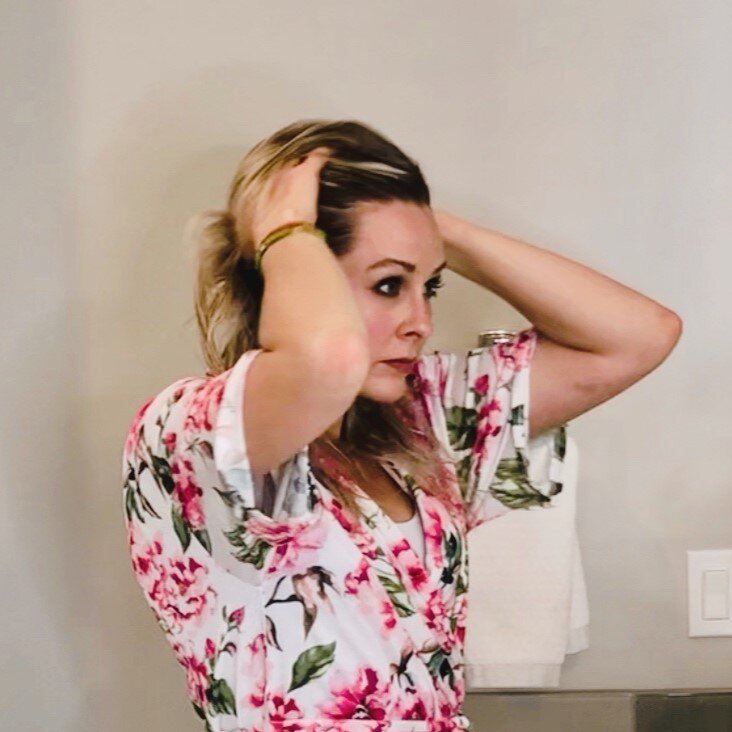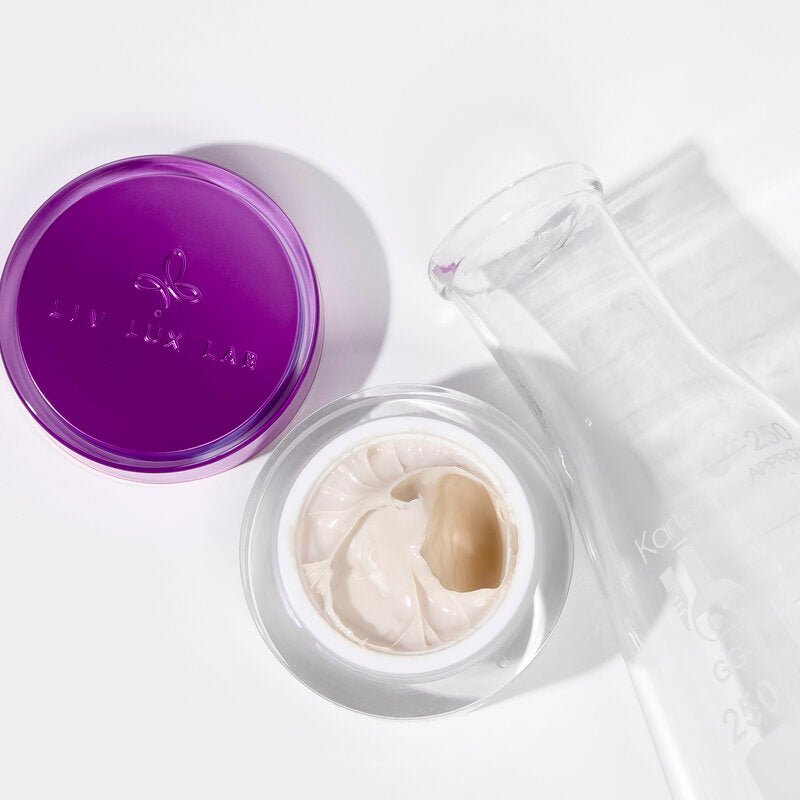We may already know that taking care of our health starts with consuming the right foods on a consistent basis - and the same goes for repairing the health and condition of our hair! While there’s a wide range of nutrients required to maintain optimal hair health, niacin benefits are certainly a key vitamin. Niacin is a vitamin that helps promote healthy hair growth. Read on to discover more about vitamin B3 for hair benefits.

What Is Niacin (Vitamin B3)?
Niacin, also known as nicotinic acid, is an essential water-soluble B vitamin, known as vitamin B3. Niacin is critical for both your internal and external health. In fact, niacin is a member of the B-complex vitamins that help the body convert nutrients (carbohydrates) into energy (glucose) which the body uses to create and repair DNA, help the liver, skin, hair, eyes, and nervous system function properly and exert antioxidant effects. Niacin helps improve circulation, suppress inflammation, and helps the body make various sex and stress-related hormones in the adrenal glands. Niacin works in the body as a coenzyme, with more than 400 enzymes dependent on it for various reactions. Vitamin B3 is a water-soluble vitamin that cannot be stored in the body and thus, its essential to obtain niacin from dietary and topical sources.
Foods Rich in Vitamin B3
- Potatoes
- Avocados
- Mushrooms
- Beets
- Sunflower seeds
- Fenugreek seeds
- Brewer's yeast
- Seafood
- Red meat and beef organs (liver and kidney)
- Fortified breads and cereals
- Tryptophan rich foods such as poultry, eggs and dairy products aren’t rich in niacin but can coverts the amino acid into niacin in the body
What is the RDA for Niacin?
The Recommended Dietary Allowance (RDA) for adults 19 and older is:
- 16 mg for men
- 14 mg for women
- 18 mg for pregnant women
- 17 mg of lactating women
- Maximum Tolerable Upper Intake level for all adults is 35 mg
Difference Between Niacin and Niacinamide
Niacin, the common name for nicotinic acid and niacinamide (also known as nicotinamide), are similarly effective as a vitamin, thus the blanket term vitamin B3 is collectively used for both. Vitamin B3 is available in several different supplement forms:
- Niacinamide
- Niacin
- Inositol hexaniacinate
It has been debated as to whether the first two forms of niacin are interchangeable as topical cosmeceuticals. Some studies claim that niacinamide and nicotinic acid are readily converted into each other while other studies state they serve different roles. Some believe, nicotinic acid for hair (otherwise known as niacin) may have more benefits than topical niacinamide on the skin since it possesses both vitamin effects on skin (increasing levels of niacinamide adenosine dinucleotide [NAD]), and drug-mediated effects on skin by interacting with nicotinic acid receptors present in the skin. Yet, the disadvantage of using topical nicotinic acid, popular as the niacin flush hair growth trend, can have unpleasant side effect of vasodilation that results in skin flushing. This is an effect that is not harmful but intensely disliked by most people. In contrast to niacin, niacinamide scalp application does not cause skin flushing. Due to the decreased number of side effects of topical niacinamide compared to nicotinic acid, the effects of niacinamide as a topical cosmeceutical ingredient are preferred.
Topical application of niacinamide has a stabilizing effect on the epidermal barrier function, helps reduce transepidermal water loss, and improves moisture content in the skin. Niacinamide leads to an increase in the protein, keratin, synthesis which has a stimulating effect on ceramide synthesis. In aging skin, topical application of niacinamide improves the surface structure, smoothens out wrinkles and inhibits skin cancer.
Niacinamide is a gentler form of niacin, offering benefits of vitamin B3 for hair and niacinamide scalp benefits too! When used in a topical product, niacinamide helps to combat the signs of aging.
In addition, one of the best things about vitamin B3 is that it works synergistically with other beneficial nutrients, enhancing the overall beneficial effects. Hair treatments like Save Me From Scalp Care + Hair Repair are formulated with the nicotinamide rich ingredient, fenugreek seeds alongside other proven ingredients like caffeine that work synergistically to treat and repair the hair while nourishing a healthy scalp for optimal hair growth.
9 Vitamin B3 Benefits for Hair with Niacin and Niacinamide
Niacin is an ingredient used in everything from shampoos to skin moisturizers. Niacin benefits for hair work in many ways to help improve the appearance and condition of your skin and hair.
While niacinamide is naturally found in various meats, eggs, milk, and green vegetables, the benefits of consuming this vitamin orally may not be as quick or effective as using a topical niacinamide for scalp care and hair treatments.
Whether you’re trying to improve the moisture balance of your hair or would simply like to improve the visible health of your scalp, here’s vitamin B3 hair benefits.
-
Niacinamide for Hair Growth
Hair loss is an increasing concern for men and women. Niacinamide has long been used as an active ingredient for anti-hair loss treatments. This led researchers to ask, “What is the connection between niacin and hair growth?” In a 2021 niacin hair growth study published in the peer-reviewed journal, Clinical, Cosmetic and Investigational Dermatology, niacinamide was shown to delay hair follicles from entering the hair’s catagen phase, the transition phase where the active growth cycle ends. This allowed for a longer growth phase of the hair.
Read more about hair growth phases and how long it takes hair to regrow, here.
In the same niacinamide hair growth study, niacinamide was also shown to protect cells from oxidative stress. Niacinamide was proven to function as an antioxidant in reducing oxidative stress and thus reduced inflammation that can cause a decline in nutrient delivery to the follicle. Oxidative stressors can cause scalp inflammation that can lead to permanent scarring and nonviable follicles the prohibit hair growth. Hair follicles are sensitive to stress and prone to damage due to pollution, product buildup and when we use harsh products. Niacin for hair loss can help reduce the oxidative stress and facilitate the elongation of the anagen phase, the growth phase of the hair growth cycle.
Read more about the role of scalp inflammation on hair loss, here.
-
Niacinamide for Hair Loss
Did you know that a reduction in blood flow can result in the thinning of hair? As we begin to age, the hair strand's diameter begins to thin, and niacin and niacinamide are key nutrients that helps to promote the look and feel of thicker hair. Niacin improves blood flow, aids in the stimulation of new hair growth and may also be helpful in reducing hair fall. In one key study published in the Journal of Cosmetic Dermatology, researchers showed that niacin increased hair fullness. In another double-blind study published in Toxicology and Environmental Health Sciences investigated not only niacin hair loss efficacy but the safety of niacinamide and found a significant increase in the number of scalp hairs (17.76%) as well as the diameter of individual hairs in the treatment group than in the placebo group after 24 weeks of niacinamide treatment for hair. The niacinamide hair loss study suggested that the niacinamide containing hair product could help prevent hair loss in alopecia patients with no abnormal symptoms.
We are impressed with the number of pathways Save Me From Age Acceleration hair repair takes to restore hair thickness and youth. To improve hair integrity and movement, lipid-rich ingredients that reduce porosity and realign a damaged cuticle are used. Amino acids that function as signaling peptides and bond-building treatment ingredients that facilitate biothiol-disulfide exchange strengthen hair and help reduce hair breakage and splits ends. Added nourishing ingredients that improve hair flexibility, reduce changing textures and color changes and stimulate scalp fertility are used.
Read more about bond-building treatments here.
-
Niacinamide to Reduce Dry Scalp and for Hair Moisture
If the scalp is dry, damaged and inflamed, the chances are likely your hair growth and hair strength will suffer. Niacinamide can help prevent dry hair and reduce the development of dandruff by properly moisturizing the scalp and by reducing water loss (called transepidermal water loss). In niacinamide dandruff clinical studies, niacin and niacinamide have been shown to help repair DNA and may protect from potential DNA damage. When the scalp isn’t fighting to reduce inflammation and isn’t working overtime to repair its moisture barrier, it can fertilize the hair follicle for proper and healthy hair growth.
When products like Save Me From Thermal Obsession hair repair are formulated with humectants (such as hyaluronic acid) and fatty acid lipids (like coconut and babassu oils), moisture can be boosted and locked into the scalp and hair strands. These replenishing ingredients can work synergistically with niacinamide to increase penetration, restore hydration and reduce scalp itch, irritation and scalp flakes.
-
Niacinamide for Improved Keratin Protein
Niacinamide increases protein synthesis, also known as keratin synthesis, as reported in this key study. In fact, the hair shaft is made up of approximately 98 percent protein. This means that a lack of vitamin B3 may contribute to how strong your hair is and, in turn, impacts overall hair health and growth.
Topical niacinamide offers a stabilizing effect to the scalp microbiome, while promoting an increase in keratin, a protein essential for improve hair strength and hair elasticity. Facial skin can quickly become damaged by the sun and your scalp is also highly susceptible to damage when exposed to UV rays for an extended period. Although there is currently not an FDA recommendation to make an SPF claim for sun protection for the hair, pongamia glabra seed oil (also known as karanja oil) has shown promise in offering protection against UVB and UVA rays and has been credited as a natural sunscreen.
-
Niacinamide Helps Reduce Scalp Inflammation
Inflammation is not only the culprit of many diseases and skin disorders, but there also is a connection between scalp inflammation and hair loss as well as hair turning grey. Hair loss due to inflammation may be caused by elevated levels of dihydrotestosterone (DHT), a sex hormone that can lead to unnecessary inflammation. In some cases, autoimmune conditions can cause excessively dry skin and symptoms such as dandruff and itching.
Niacinamide has been shown to act as an antioxidant and can reduce oxidative stressors that can lead to inflammation. Researchers have also found while treating acne, vitamin B3 could help manage inflammatory lesions without negative side effects. In its niacinamide form, vitamin B3 has been shown to be a long-term solution to help ease scalp inflammation without negative side effects.
It's important to use ingredients that help limit scalp inflammation during chemical treatments. Straightening techniques such as hair relaxers have been associated with eczema, pain, burns and scalp inflammation that can lead to hair loss and hair shaft damage. The ingredients found in Save Me From Chemical Conflict hair repair include niacinamide-rich fenugreek as well as South African rooibos, a red tea with anti-inflammatory effects to help less scalp inflammation during chemical treatments at the salon.

-
Niacinamide’s Antioxidant Activity
Niacinamide for hair benefits is vast. Niacinamide is often studied as the niacin derivative with its ability to support cell turnover and may help reduce one’s risk of skin cancer, as reported in a 2017 study in the International Journal of Cancer entitled, Niacin Intake and Risk of Skin Cancer in US Women and Men.
Since research suggests that vitamin B3 can initiate DNA repair while increasing the rate of cellular reproduction, treatments rich in this vitamin can possibly support the healing of skin damaged by pollution damage and the sun’s UV rays.
Although you can be exposed to pollutants anywhere you live or work, in any case, it’s important to combat oxidative stress that can lead to hair loss. Save Me From hair treatments are formulated with a variety of antioxidant rich ingredients to help protect the hair and scalp.
-
Niacinamide Helps Regulate Scalp and Hair Oil Production
Is niacinamide good for scalp? Yes. Buildup on the scalp is a concern that not only impacts the appearance and texture of hair but can also affect hair growth. Excess sebum, particulate matter from pollution, dead skin cells, and residue from hair styling products can cause inflammation that leads to scalp damage, dryness and impacted growth of hair.
Studies have shown that topical niacinamide hair application may impact sebum production and excretion rates. A study published in the Journal of Cosmetic and Laser Therapy found that when participants were treated with topical 2% niacinamide overall sebum extraction rates were significantly lower after two and four weeks.
Since too much oil can cause plugged sebaceous glands, which may become itchy and uncomfortable, it’s important to target your scalp if it’s excessively oily. In this case, Save Me From Product Overload, a pre-shampoo detox treatment that uses Brazilian black clay + peat moss to enhance the purifying process by removing excess oil, dead skin cells, and impurities on the scalp through capillary action.
-
Niacinamide Can Reduce Hyperpigmentation
Much like the skin on the face, extended sun exposure can cause damage and, in this case, hyperpigmentation to not only the skin but also the scalp! This causes melanocytes (a specific type of cell) to produce melanosomes, which can then impact the pigment of your hair. Although niacin does not stop production, it has been shown to inhibit the increased transfer of these pigment granules.
-
Anti-Aging Benefits of Niacinamide for Scalp and Niacinamide for Skin
One of the main benefits associated with niacin is its ability to reduce fine lines and wrinkles. Research shows that niacin can help keep aging skin firmer through its circulation-boosting properties that not only boost hair thickness, but hair strength! It is also important to note that niacin can help combat the thinning of the dermis and epidermis, which occurs as we age — due to niacin’s ability to repair and maintain healthy skin.
Is niacin good for scalp? Niacin and hair growth go hand in hand because vitamin B boosts energy and improves blood flow to the scalp. Much like niacin’s role in improving the health of hair follicles, a consistent supply of oxygen must be available to support metabolic, cellular functions. Since niacin can increase the available supply of oxygen, skin cells can significantly benefit.
Using an antioxidant rich scalp serum and hair treatments formulated with vitamin B3, like Save Me From Age Acceleration, is a solution for hair thinning, delivering body and volume to fine and thin hair, clinically proven to increase hair thickness by 203% in 3 overnight treatments.
Can Niacinamide Penetrate Within the Skin?
Yes, it has long been demonstrated that niacinamide offers significant penetration info human skin according to studies published in the Journal of Investigative Dermatology. With effective skin penetration, niacinamide on scalp has been shown to increase niacinamide adenosine dinucleotide (NAD) which have potent antioxidant and barrier repair properties within the skin. Through its antioxidant capabilities, niacinamide inhibits oxidative processes, reduces protein oxidation and glycation. By its epidermal barrier function repair properties, skin moisture levels and resistance to damage are improved. These capabilities are what has shown niacinamide benefits for skin, including smoother skin, reduced fine lines and wrinkles, decreased hyperpigmentation, reduced redness, improved skin elasticity and improved skin moisture.
What are the Risks of a Vitamin B3 Deficiency?
Although its necessary to find a topical source for niacinamides benefits for hair, it’s relatively easy to consume Vitamin B3 through our diets. In the US, alcoholism is the main cause of vitamin B3 deficiency. Symptoms of mild B3 deficiency include:
- Poor circulation
- Canker sores
- Depression
- Headaches
- Fatigue
- Pellagra
When vitamin B3 is severely lacking, a condition called Pellegra can cause cracked, scaly skin, dementia, and diarrhea. It can also cause burning in the mouth and a swollen, bright red tongue.
Side Effects of Niacin for Hair
Niacin side effects or toxicity when eating foods containing niacin is rare but can occur from long-term use of high-dose supplements. When deciding between niacin vs niacinamide for hair growth it's good to know a common sign among people taking high doses of niacin report reddened skin flush with itchiness or tingling on the face, arms, and chest. This is what is known as the niacin flush and why niacin for hair benefits may not be as appealing or as tolerated as niacinamide. These symptoms usually go away after stopping the supplement and seen when taking high dosages in the niacin form, rather than niacinamide.
Is Niacinamide Good for Hair or Is Niacin Good for Hair?
Yes, vitamin B3 is good for hair but niacinamide benefits for hair may be better than the benefits of niacin for hair. You may be asking yourself, "does niacin help with hair growth?" Many studies have shown niacinamide on hair possess vitamin B3 for hair growth benefits. To summarize, benefits of vitamin B3 for hair include:
- Extended hair growth phase
- Reduced hair loss
- Restore skin barrier that helps reduce dryness and improve scalp moisture to help dandruff
- Balances scalp health for healthy keratin production and stronger hair
- Helps reduce inflammation that can constrict healthy hair growth
- Acts as antioxidant to help improve DNA and reduce oxidative stress damage
- Regulates an oily scalp and greasy hair
- Reduces skin discoloration
- Boosts energy and blood flow which helps with nutrient delivery throughout scalp and skin for healthier hair growth and less fine lines and wrinkles
How to Use Niacin for Hair Growth? The Ayurvedic Spice Rich in Niacinamide That's Changing Everything
Do you need a niacinamide serum for hair? It's worth mentioning the proven hair reparative benefits of Fenugen. Inspired by Ayurvedic medicine, we've harnessed the fenugreek's rich phytonutrients including medium and long chain fatty acids, terpenoids, polyphenols, phospholipids and vitamins A, C and B variety vitamins and paired these with bio-boosters like ubiquinone (also known as Coenzyme Q10 for hair), organic karanja (also known as pongamia) and medicum chain triglycerides (MCT’s derived from coconut). You’ve guessed it, like a Red Bull for your scalp, Fenugen is also a rich source of nicotinic acid (niacin), nicontinamide (niacinamide) and trigonelline. These phytonutrients include niacinamide hair benefits and have been shown to promote healthy blood flow to help enhance the nutrition essential for follicle survival, boost keratin and ceramide synthesis, restore barrier function and empower you with hair that emerges from the scalp healthier with more resistance to damage. Through a patented eco extraction process, we've magnified these phytonutrients into our clinically proven technology. Fenugen possesses the rich nutrients of fenugreek seeds in a complex 5x more potent in polyphenols. These nutrients include Vitamin A, B Vitamins, Vitamin C and more. With daily and consistent, long-term use of this concentrated hair cream (that you dilute into a silky scalp serum with water), hair bonds are rebuilt, hydration is restored helping to reduce frizz, the scalp is energized and nourished from within allowing hair that's more resistant to damage to emerge. Rooted in Ayurveda, our Save Me From hair products are clinically proven to transform hair from tip to root, inside and out.
***
Ashihara H, Ludwig I, Katahira R, Yokota T, Fujimura T, Crozier A. (2015) Trigonelline and related nicotinic acid metabolites: occurrence, biosynthesis, taxonomic considerations, and their roles in planta and in human health. Phytochemistry Reviews, 14, 765-798.
Choi YH, Shin JY, Kim J, Kang NG, Lee S. Niacinamide Down-Regulates the Expression of DKK-1 and Protects Cells from Oxidative Stress in Cultured Human Dermal Papilla Cells. Clin Cosmet Investig Dermatol. 2021 Oct 18;14:1519-1528. doi: 10.2147/CCID.S334145. PMID: 34703266; PMCID: PMC8536842.
Draelos ZD, Jacobson EL, Kim H, Kim M, Jacobson MK. A pilot study evaluating the efficacy of topically applied niacin derivatives for treatment of female pattern alopecia. J Cosmet Dermatol. 2005 Dec;4(4):258-61. doi: 10.1111/j.1473-2165.2005.00201.x. PMID: 17168873.
Draelos ZD, Matsubara A, Smiles K. The effect of 2% niacinamide on facial sebum production. J Cosmet Laser Ther. 2006 Jun;8(2):96-101. doi: 10.1080/14764170600717704. PMID: 16766489.
Feldmann RJ, Maibach HI. Absorption of some organic compounds through the skin in man. J Invest Dermatol. 1970;54:399–404.
Gehring W. Nicotinic acid/niacinamide and the skin. J Cosmet Dermatol. 2004 Apr;3(2):88-93. doi: 10.1111/j.1473-2130.2004.00115.x. PMID: 17147561.
Kafa, A.H.T., Tüzün, G., Güney, E. et al. Synthesis, computational analyses, antibacterial and antibiofilm properties of nicotinamide derivatives. Struct Chem 33, 1189–1197 (2022). https://doi.org/10.1007/s11224-022-01927-x
Lee, W., Bae, JS. Anti-inflammatory Effects of Aspalathin and Nothofagin from Rooibos (Aspalathus linearis) In Vitro and In Vivo . Inflammation 38, 1502–1516 (2015). https://doi.org/10.1007/s10753-015-0125-1
Levin J, Momin SB. How much do we really know about our favorite cosmeceutical ingredients? J Clin Aesthet Dermatol. 2010 Feb;3(2):22-41. PMID: 20725560; PMCID: PMC2921764.
Michael G. Davis, Melissa P. Piliang, Wilma F. Bergfeld, Tamara L. Caterino, Brian K. Fisher, Jarek P. Sacha, Greg J. Carr, Laura T. Moulton, Deborah J. Whittenbarger, Supriya Punyani, James R. Schwartz, Scalp application of the antioxidant piroctone olamine reduces hair shedding in an 8‐week randomized, double‐blind, placebo‐controlled clinical study, International Journal of Cosmetic Science, 10.1111/ics.12737, 43, S1, (S26-S33), (2021).
Nathache Hatsbach de Paula, Joane, et al. Effects of Chemical Straighteners on the Hair Shaft and Scalp. An. Brazil Dermatology. 2022, 97 (02).
Park SM, Li T, Wu S, Li WQ, Weinstock M, Qureshi AA, Cho E. Niacin intake and risk of skin cancer in US women and men. Int J Cancer. 2017 May 1;140(9):2023-2031. doi: 10.1002/ijc.30630. Epub 2017 Feb 14. PMID: 28152570; PMCID: PMC5937269.
Solano, Francisco. Photoprotection and Skin Pigmentation: Melanin-Related Molecule and Some oOther New Agents Obtained from Natural Sources. Molecule. 2020, March, 25(7).
Weber, J., Hasan, L., Jermann, T., Sciotti, M.A., Gygax, D. and Scholer, D. (2014) Method for Determination of the Concentration of Vitamin B6 in a Sample. US Patent No: 9574221





